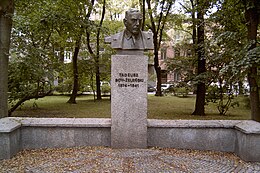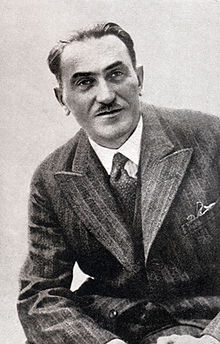Tadeusz Boy-Żeleński

Tadeusz Kamil Marcjan Żeleński , called Boy , ( ) (* December 21, 1874 in Warsaw , † July 4, 1941 in Lemberg ) was a Polish poet , translator of French literature and literary and theater critic .
Life
Boy was the son of the composer Władysław Żeleński and studied medicine in Kraków from 1892 to 1900 . In 1901 he began to practice as a doctor and at the same time he wrote his first literary works. In 1906 he founded the cabaret Zielony Balonik in the restaurant of the Michalik cave and from then on concentrated entirely on the development of satirical texts for the cabaret. During the First World War he served as a doctor in the Austrian army . After the war, in now independent Poland, he moved to Warsaw in 1922 and continued his literary work. When the Second World War broke out in 1939, he fled to Lemberg in the eastern Polish territories. After the German-Soviet non-aggression pact , Lemberg was occupied by the Red Army and the Soviet commissioners appointed Boy as a professor of French literature at Lviv University . When the German Wehrmacht occupied Lemberg in 1941, he was arrested by the Nachtigall battalion on the night of July 3rd, 1941 and murdered that same night with other Lemberg professors (see mass murders in Lemberg in the summer of 1941 ).
In addition to satires, poems and song texts, Boy's work consists primarily of congenial translations of French literature into Polish. His translations are published to this day, the translations of the plays are still performed in Polish theaters and are part of the canon of school reading. From the cabaret texts an anthology Słówka (“Little Words ”) was created - a source of quotations that is still up-to-date after 100 years.
An important part of his work was the feature section in the weekly Wiadomości Literackie (“Literary News”). There Boy showed himself to be an uncompromising fighter for the modernization of Polish society. Some of his feature pages later appeared in the form of brochures: Dziewice Konsystorskie (“The Consistorial Council Virgins”) ( 1929 ), Piekło kobiet (“The Women's Hell”) ( 1930 ), Jak skończyć z piekłem kobiet (“How can you Put an end to the hell of women ”) ( 1932 ), Nasi okupanci (“ Our occupying powers ”) ( 1932 ). The first three were devoted to the situation of women in the clerical state, the lack of legal divorces and the mendacious ecclesiastical authorities which, in return for payment, certified the absence of an unsuccessful marriage, as well as the rejection of sexual education and contraception. The fourth booklet dealt with the excessive influence of the ecclesiastical authorities on the Polish state, the greed of the church and the consequences of celibacy among priests. Boy-Żeleński was denounced by the bishops in the pastoral letters as an enemy of the church, as a "messenger of Satan".
Boy Point , a headland in the Antarctic , and rue Boy-Zelenski in the 10th arrondissement in Paris are named after him .
Translations from French (a selection)
Boy translated works by the following authors from French into Polish :
- François Villon
- Molière
- Pierre Carlet de Marivaux
- Jean Racine
- Pierre Corneille
- Voltaire
- Blaise Pascal
- Montesquieu
- Denis Diderot
- Michel de Montaigne
- Jean-Jacques Rousseau
- Honoré de Balzac
- Stendhal
- Choderlos de Laclos
- Marcel Proust
Web links
- Literature by and about Tadeusz Boy-Żeleński in the catalog of the German National Library
| personal data | |
|---|---|
| SURNAME | Boy-Żeleński, Tadeusz |
| ALTERNATIVE NAMES | Żeleński, Tadeusz Kamil Marcjan (real name) |
| BRIEF DESCRIPTION | Polish poet and translator of French literature |
| DATE OF BIRTH | December 21, 1874 |
| PLACE OF BIRTH | Warsaw |
| DATE OF DEATH | 4th July 1941 |
| Place of death | Lviv |
